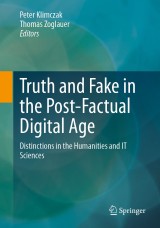Details

Truth and Fake in the Post-Factual Digital Age
Distinctions in the Humanities and IT Sciences|
CHF 59.00 |
|
| Verlag: | Springer |
| Format: | |
| Veröffentl.: | 24.05.2023 |
| ISBN/EAN: | 9783658404062 |
| Sprache: | englisch |
Dieses eBook enthält ein Wasserzeichen.
Beschreibungen
<div><div><p>The increase in fake news, the growing influence on elections, increasing false reports and targeted disinformation campaigns are not least a consequence of advancing digitalisation. Information technology is needed to put a stop to these undesirable developments. With intelligent algorithms and refined data analysis, fakes must be detected more quickly in the future and their spread prevented. However, in order to meaningfully recognize and filter fakes by means of artificial intelligence, it must be possible to distinguish fakes from facts, facts from fictions, and fictions from fakes. This book therefore also asks questions about the distinctions of fake, factual and fictional. The underlying theories of truth are discussed, and practical-technical ways of differentiating truth from falsity are outlined. By considering the fictional as well as the assumption that information-technical further development can profit from humanities knowledge, the authors hope that content-related, technical and methodological challenges of the present and future can be overcome.</p><br></div></div>
Introduction.- Truth Relativism, Scientific Skepticism and the Political Consequences.- Of Fakes and Frauds: Can Scientific "Hoaxes" Be a Legitimate Tool of Knowledge?.- Fiction, Fake and Fact.- Stranger than Fiction.- The Marxist-Leninist Definition of Fascism and the Building of the Wall.- Caution: Possible "Fake News" - A Technical Approach to Early Detection.- Countering Fake News Technically - Detection and Treatment Approaches to Support Users.- NewsDeps: Visualizing the Origin of Information in News Articles.<br>
<div><b><i>Peter Klimczak</i></b> (Dr. phil. et Dr. rer. nat. habil.) teaches media, cultural and technical sciences at the Brandenburg University of Technology and conducts research at the University of Wroclaw within the framework of a Feodor Lynen Research Fellowship. He is the author of numerous publications on the use of artificial languages in media and cultural studies, on digital and social media, and on cognitive systems and artificial intelligence. <br></div><div><div><br></div><div><p><b><i>Thomas Zoglauer</i></b> (Dr. phil. habil.) teaches philosophy as an adjunct professor at the Brandenburg University of Technology and as a lecturer at the universities of Freiburg and Stuttgart. He is the author of numerous books on the philosophy of technology, logic and applied ethics.</p><br></div></div>
The increase in fake news, the growing influence on elections, increasing false reports and targeted disinformation campaigns are not least a consequence of advancing digitalisation. Information technology is needed to put a stop to these undesirable developments. With intelligent algorithms and refined data analysis, fakes must be detected more quickly in the future and their spread prevented. However, in order to meaningfully recognize and filter fakes by means of artificial intelligence, it must be possible to distinguish fakes from facts, facts from fictions, and fictions from fakes. <div><br></div>This book therefore also asks questions about the distinctions of fake, factual and fictional. The underlying theories of truth are discussed, and practical-technical ways of differentiating truth from falsity are outlined. By taking into account the fictional as well as the assumption that information-technical advancements can benefit from humanities knowledge, the authors hope that content-related, technical and methodological challenges of the present and future can be met. <div><br></div><div><b>Peter Klimczak </b><i>(Dr. phil. et Dr. rer. nat. habil.)</i> teaches media, cultural and technical sciences as a private lecturer at the Brandenburg University of Technology and conducts research as part of a Feodor Lynen Research Fellowship at the University of Wroclaw. He is the author of numerous publications on the use of artificial languages in media and cultural studies, on digital and social media, and on cognitive systems and artificial intelligence. </div><div><br></div><div><b>Thomas Zoglauer </b><i>(Dr. phil. habil.</i>) teaches philosophy as an adjunct professor at the Brandenburg University of Technology and as a lecturer at the Universities of Freiburg and Stuttgart. He is the author of numerous books on the philosophy of technology, logic and applied ethics.<br></div><div><br></div><div><div>This book is a translation of an original German edition. The translation was done with the help of artificial intelligence (machine translation by the service DeepL.com). A subsequent human revision was done primarily in terms of content, so that the book will read stylistically differently from a conventional translation.</div></div>
Combines approaches from the humanities, social sciences, and computer science Treats phenomena of fake (news) in the context of concepts of truth Includes fictionality and fictional narratives in addition to facticity and fake
<div><br></div>
Diese Produkte könnten Sie auch interessieren:

Quantitative Measure for Discrete Event Supervisory Control

von: Asok Ray, Vir V. Phoha, Shashi Phoha

CHF 118.00















